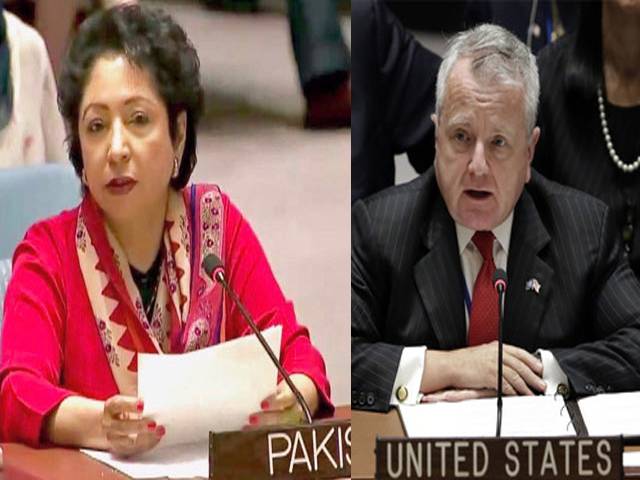New York - Pakistan and United States have clashed at the United Nations over Afghanistan.
The US urged Pakistan not to give sanctuary to “terrorist organisations” – and Pakistan demanded that the Trump administration address safe havens inside Afghanistan and its income from the narcotics trade.
The exchange took place Friday at a Security Council meeting on the issue of Afghanistan’s relations with its Central Asia neighbours and the link between peace and security.
US Deputy Secretary of State John Sullivan said the United States can’t work with Pakistan if it continues to give sanctuary to terrorist organisations and need to stop this and join efforts to resolve the Afghan conflict.
In a forceful rebuttal of US accusation of terrorist ‘safe havens’ on Pakistan’s soil, Ambassador Maleeha Lodhi told the UN Security Council that envisioning that these sanctuaries lie outside Afghanistan need a reality check.
Lodhi countered that Afghanistan and its partners, especially the US, need to address ”challenges inside Afghanistan rather than shift the onus for ending the conflict onto others. Those who imagine sanctuaries outside need a reality check,” she stressed.
The exchange followed the Trump administration’s announcement this month that it was suspending military aid to Pakistan until it takes decisive action against militants.
Sullivan told the council that an Afghan-led, Afghan-owned approach to peace, with firm international support for Afghan security forces, ”will make clear to the Taliban that victory cannot be won on the battlefield – a solution is and must be political.” But he said: “We must recognise the reality that while the Afghan government has been adamant about its interests in initiating peace talks with the Taliban, there has been no reciprocal interest on the part of the Taliban.” “That must change,” Sullivan stressed.
He urged international efforts to isolate the Taliban, eliminate its sources of income and equipment. Sullivan also criticised unnamed countries for supporting the Taliban in the name of fighting the Islamic State extremist group, also known as ISIS. “This approach is misguided or worse pernicious,” he said. “The United States believes that the two are not linked. We can and must fight ISIS in Afghanistan while ensuring the Taliban come to the negotiating table.”
Maleeha Lodhi said that after 17 years of war it’s “more than evident” that neither the Afghan government nor the Taliban can win militarily. “The continuing resort to military force and escalation of the conflict without an accompanying political and diplomatic strategy … will produce more violence, not a political solution,” she said. “It is not enough to pay lip-service to a negotiated settlement and then do little other than exercise a strategy of force and coercion.”
“At the same time,” she added, “we call on the Taliban to abandon the path of violence and join talks.”
Lodhi also hit back at Indian Ambassador Syed Akbaruddin’s allegation about Pakistani mindset of promoting cross-border terrorism, saying, “Those who talk of changing mindsets need to look within, at their own record of subversion against my country as our capture of an Indian spy (Kulbhushan Jadhav) has proven beyond doubt.”
In her remarks, the Pakistani envoy pointed out that over 40 percent of Afghanistan was under the control of insurgent groups, and that illicit drug trafficking provided them with a steady financial income estimated at $400 million a year.
“Indeed, with its safe havens inside the country and income from the narcotics trade, the insurgency does not need any outside assistance or ‘support centres’ to sustain itself,” she added.
Sustainable peace would only be achieved through a negotiated settlement to the conflict, Lodhi emphasised. “Apart from Afghanistan, it is Pakistan, which has the most to gain from peace in Afghanistan,” she said.
Pakistan, she said, continues to host the largest protracted presence of Afghan refugees anywhere in the world. My country has been the major victim of terrorism and violence emanating from Afghanistan’s wars,” she told the delegates.
Pakistan has fought and defeated terrorism within Pakistan, and its counter-terrorism campaign, deploying a 200,000 strong force, has turned the tide of terrorism. “Our ability to totally eliminate terrorist attacks in Pakistan depends on effective control of the border with Afghanistan,” she said, adding Islamabad had enforced stringent border management measures on our side of the border - yet to be matched on the other side by the Afghan government.
The envoy said despite the large presence of foreign military forces in Afghanistan and the large sums of development aid that had been provided to the country, security had deteriorated and economic growth had been anaemic. The people of Afghanistan had paid a heavy price for more than four decades of foreign invasions and bloody civil war.
The entire region had been buffeted by the turmoil, drugs and instability radiating from Afghanistan, she said.
Strengthening bilateral relations was a priority for her government, and Pakistan had undertaken a number of initiatives to promote the development of Afghanistan, including commitments totalling some $1 billion to various infrastructure development projects in Afghanistan. Yet, she said none of those efforts could be successful without the restoration of peace.
Sullivan, Lodhi and Afghanistan’s Deputy Foreign Minister Hekmat Khalil Karzai did not mention the US suspension of aid to Pakistan. But Karzai said: “We are pleased to note that the imperative of addressing the problem of regional terrorist sanctuaries and safe havens is now recognised more than ever before.”
He said there is an opportunity to shift regional threats from terrorism, instability and other criminal activities to peace, security and development – and that is Afghanistan’s goal.
Pakistan, US clash at UN over Afghanistan
Agencies






